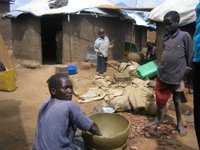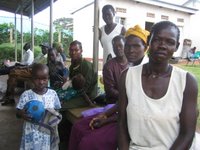A few people have expressed an interest in knowing what a typical day is like for me …
My alarm clock rings every morning at 6:37am. It’s this or nature’s alarm clock – a rooster - that rouses me. Typically I’ve slept well on the sturdy foam that is called my mattress. That is, except for the nights when there has been a mosquito incident. Imagine a mosquito buzzing in your ear all night - it incites something akin to what it must feel like to go mad. If only I could negotiate with a mosquite, I'd shout: "bite me as much as you want, just SHUT UP!"
My routine from the time I step out of bed to the moment I step out the door depends entirely on where in the electricity rotation we are. Actually, rotation is not quite the right word - rotations are consistent and reliable. This is not. It is supposedly “24 hours on, 24 hours off” however what it actually amounts to is some days we have electricity and some days we don’t. Therefore some mornings I have the joy of a warm shower and other mornings I make use of my newly acquired rinse-quickly-while-standing-on-the edge-of-the-shower skills; some mornings I savor warm toast smeared with ground simnut while other mornings I am content with bread and peanut butter.
In Kampala the run-down, barely-running version of a Vespa is called a boda-boda and is one of the only means of transport, particularly if you don’t want to sit on top of someone else in an overcrowded taxi bus in the middle of the city’s traffic jam for hours on end. On the many mornings when I don’t get up early enough to walk to work I indulge one of the countless men on every corner who call after me: “my sister!” I pay the lucky man to speed through the dusty, crowded streets of Kampala on his boda-boda with me side-saddled behind him– but only after I have insisted that he drive “mpolla, mpolla” (“slowly, slowly”).
My workday begins at 8:30am. Inevitably by the time I arrive there are already dozens, often hundreds, of people seated under the canopy flanking the building’s front door. Women, men and children are there to receive anti-retroviral drugs, to see a doctor about a painful cough (or any number of other ailments), or to talk with a counselor. The first floor of our building is a clinic, the top floors are where staff plan budgets, write strategies, and design interventions. I spend my days upstairs. From where I sit, looking past my computer and through the window, I watch the line of people grow and then diminish as the hours pass. I listen to children laughing, and crying, throughout the day.
Most of my friends at the office are women in their mid to late 20s. Some of them are staff and many more are volunteers. It is extremely difficult for university graduates to find work in Uganda – you are considered one of the lucky ones if you find a fulltime volunteer position that after a year or two may turn into a paid position. Some of my friends are married – if they’ve been married for more than a few months it’s a given that they have at least one baby. Other of my friends have a baby yet no man. Others still have neither a man nor a baby – they call themselves “single and searching.” Like in most places among women our age, the day is punctuated by chats about babies, a visit to the salon, a family obligation this weekend or a trip to the market last night. Surprisingly we don’t often talk about men.
At 1pm each afternoon I venture to the canteen next door for lunch. It is here that several of the female HIV/AIDS clients from the clinic earn money by cooking and serving lunch to anyone willing to pay 1,500 Ugandan shillings. For less than US.80 cents I eat my fill of rice, sweet potatoes, Irish potatoes, kale, pumpkin, beans, groundnut sauce and matooke. Matooke is mashed bananas (imagine the consistency of mashed potatoes but with a different taste and color). It is a staple in this part of Uganda – in fact when someone refers to food they are talking about matooke. People fill their plates with many other things, including chicken and beef, but the only thing that qualifies as food is matooke.
At approximately 4:30pm the workday ends and I begin my walk home. The afternoon means disappointment for the boda-boda drivers – my response to their “Let’s go” is always “Nayda sebbo” (“no sir”). Instead of riding I opt to walk the 30 minutes between my work and home. The walk begins along a dirt path amongst barely-standing homes and roaming livestock; it ends on busy, barely-paved roads past small stalls and big homes. All along the way children shout and adults comment: “muzungu, muzungu!” (“white person, white person!”). I am greeted with “hi, how are you?” by countless schoolboys and girls. Often I have to explain to a persistent man that my husband would not like it if another man walked me home. You can imagine how much I despise having to pretend that I belong to one man in order to keep another man at bay.
The walk isn’t all uninvited commotion though. There are the two women who sell grilled maize and small sweets on the roadside and who unfailingly greet my attempts to converse in their language with huge smiles and warm laughter. There is the woman at the thatch stall where I buy tomatoes, avocado, eggplants, onions or whatever else is needed for the evening’s menu – her young son is in awe of his mother’s new friend. There is also Lucy – the woman who runs the food stall on our block. Lucy is there to welcome me home each evening, to tell me about her day and to listen as I share the events of mine.
Just like the mornings, once at home my evening routine is determined by the electricity situation. A gas stove ensures that we can eat every night. The question is whether we chop tomatoes, fry eggplants and steam rice by the dim light of a kerosene lantern or not. Regardless of how well we can see each other, after cooking most hours of the evening are spent gathered around the dinner table recounting the days mishaps or debating about why Ugandan men do the things they do or speculating about something like the relevancy of the United Nations.
The day ends with hot Ugandan tea and sugar.












